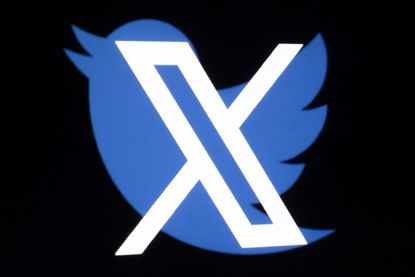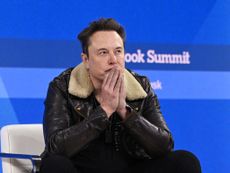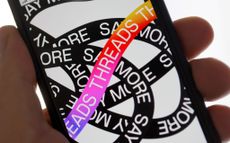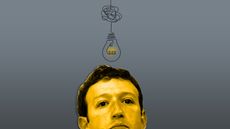Elon Musk kills the bird
Is X a necessary evil or more of an expensive mistake?

The smartest insight and analysis, from all perspectives, rounded up from around the web:
Farewell, Twitter, said Oliver Darcy at CNN. This week, "the text-based social media platform that played an outsize role in society by serving as a digital town square was killed by its unhinged owner, Elon Musk." Musk officially changed the company's iconic bird logo to an "X" as part of a sweeping rebrand. "X might resemble Twitter," at least initially, but "it is not the same platform it was" before Musk bought it for $44 billion last October and "quickly decapitated the former leadership and threw the company into chaos and turmoil." Despite the rebrand, X will still inherit all of Twitter's problems, including fleeing advertisers and new competition from Mark Zuckerberg and Threads. Maybe we can find closure now that we can "separate Twitter from what Musk has transformed it into."
Indeed, Twitter as we knew it is dead, said Mike Allen in Axios. The new name is the first step in Musk's bet-the-house gamble of "transforming the platform into a merger of a moneyless marketplace + public square + video content factory — his everything vision for an everything app." Think Twitter + Substack + YouTube + PayPal + Amazon + TikTok + WeChat + Baidu, all rolled into one. According to biographer Walter Isaacson, who's writing a book about Musk, he has been "plotting the Twitter rebranding for nine months." Actually, "X" has been "a consistent presence in the billionaire's business brandings and personal life for decades," said Rachel Shin in Fortune. In 1999, Musk founded X.com, an online banking startup, which merged with PayPal. He later repurchased the domain X.com from PayPal in 2017, seemingly "for purely nostalgic purposes." Now we know he had a plan for it all along.
Subscribe to The Week
Escape your echo chamber. Get the facts behind the news, plus analysis from multiple perspectives.

Sign up for The Week's Free Newsletters
From our morning news briefing to a weekly Good News Newsletter, get the best of The Week delivered directly to your inbox.
From our morning news briefing to a weekly Good News Newsletter, get the best of The Week delivered directly to your inbox.
The bird had to go, said Peter Franklin in UnHerd. Twitter could be "the perfect launchpad" for an everything app if it's not tied to its reputation as a microblogging site. It has "hundreds of millions of users in multiple countries, a super-accessible user interface, and a public profile that, unlike most social networks, does not limit its appeal to narrow demographics." Those are strong "everything app" credentials. Except that plan hasn't worked for other "companies bigger, richer, and smarter than X," said Dave Lee in Bloomberg. The conditions that make super apps work in Asia don't apply in the U.S. market, where "consumers aren't (for the most part) un- or under-banked, or lacking in credit options." And "even companies that dominate in many areas — like Google — have learned that consumers don't want everything locked" into one place, due partly to the simple fact that "apps that try to do too much become cluttered and slow."
"I guess my question is, what was he paying for?" said Matt Levine, also in Bloomberg. "So far, Musk has done a lot to make Twitter less useful but nothing, as far as I can see, to make it more useful." Adding a fintech element to Twitter's messaging capability is interesting, in theory. But all his moves suggest Musk wanted something completely different from Twitter, and he could have built that for far less than $44 billion.
This article was first published in the latest issue of The Week magazine. If you want to read more like it, you can try six risk-free issues of the magazine here.

Continue reading for free
We hope you're enjoying The Week's refreshingly open-minded journalism.
Subscribed to The Week? Register your account with the same email as your subscription.
Sign up to our 10 Things You Need to Know Today newsletter
A free daily digest of the biggest news stories of the day - and the best features from our website
-
 6 tips to shop online safely this holiday season
6 tips to shop online safely this holiday seasonThe Explainer Lower the chances of credit card fraud spoiling your holidays
By Becca Stanek, The Week US Published
-
 The daily gossip: Anya Taylor-Joy leads epic 'Furiosa' trailer, Felicity Huffman felt she 'had to break the law' in college admissions scandal, and more
The daily gossip: Anya Taylor-Joy leads epic 'Furiosa' trailer, Felicity Huffman felt she 'had to break the law' in college admissions scandal, and moreThe daily gossip: December 1, 2023
By Brendan Morrow, The Week US Published
-
 What's Qatar's role in the Middle East conflict?
What's Qatar's role in the Middle East conflict?Today's Big Question Doha hosts both Hamas and a U.S. military base. That puts it at the center of the conflict in Gaza.
By Joel Mathis, The Week US Published
-
 Elon Musk overshadows his own Cybertruck rollout
Elon Musk overshadows his own Cybertruck rolloutTalking Point The X owner's latest bizarre public appearance and incendiary comments threaten to derail the 'biggest product launch of anything by far on Earth this year'
By Rafi Schwartz, The Week US Published
-
 Elon Musk to X's fleeing advertisers: 'Go f--- yourself' and 'don't advertise'
Elon Musk to X's fleeing advertisers: 'Go f--- yourself' and 'don't advertise'Speed Read 'What this advertising boycott is going to do is to kill the company,' Musk said at a public conference
By Peter Weber, The Week US Published
-
 Threads: Meta's Twitter clone gains a foothold
Threads: Meta's Twitter clone gains a footholdfeature The competition to usurp Twitter is heating up
By The Week Staff Published
-
 Can Linda Yaccarino save Twitter?
Can Linda Yaccarino save Twitter?feature The new CEO is taking on a near-impossible job
By The Week Staff Published
-
 Twitter: how are the company’s finances?
Twitter: how are the company’s finances?feature Elon Musk says Twitter is ‘breaking even’ but industry experts have slashed ad revenue projections
By Harriet Marsden Published
-
 Elon Musk: Remaking Twitter in his own image
Elon Musk: Remaking Twitter in his own imagefeature Why the blue checkmark has lost its value
By The Week Staff Published
-
 Is Mark Zuckerberg out of ideas?
Is Mark Zuckerberg out of ideas?Speed Read The subscription service Meta Verified sounds awfully familiar
By Theara Coleman Published
-
 Can Twitter be blamed for the fall in Tesla's stock price?
Can Twitter be blamed for the fall in Tesla's stock price?opinion The sharpest opinions on the debate from around the web
By Joel Mathis Published










